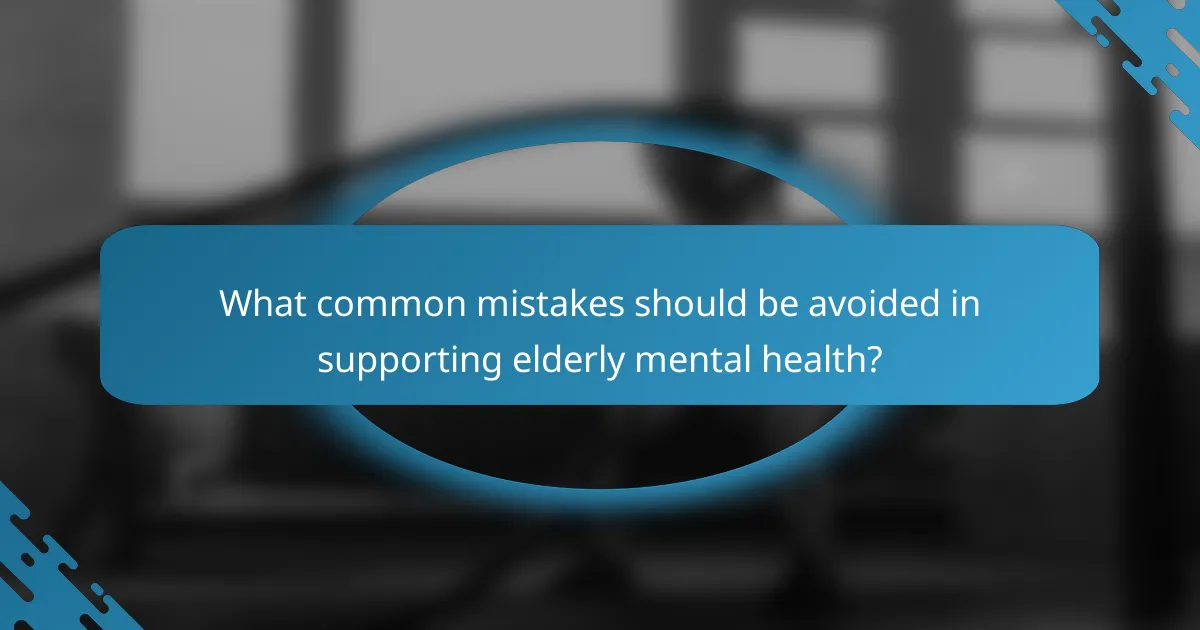Improving mental health in seniors is essential for enhancing their emotional well-being and reducing feelings of isolation. Key strategies include fostering social engagement, maintaining physical health, and encouraging creative pursuits. Unique activities like art therapy and mindfulness practices can further support emotional regulation. Ensuring regular social interactions and access to professional help is crucial for ongoing mental health support.

What are the key factors influencing mental health in seniors?
Social connections, physical health, and mental stimulation are key factors influencing mental health in seniors. Social engagement reduces feelings of isolation and loneliness. Regular physical activity enhances mood and cognitive function. Mental stimulation through activities like reading or puzzles promotes brain health. These factors collectively contribute to emotional well-being in older adults.
How does social engagement impact emotional well-being?
Social engagement significantly enhances emotional well-being by reducing feelings of loneliness and isolation among seniors. Engaging with others fosters a sense of belonging and purpose, which are crucial for mental health. Studies show that seniors who participate in social activities experience lower rates of depression and anxiety. Additionally, regular social interactions can lead to improved cognitive function and overall life satisfaction.
What role does physical health play in mental health for the elderly?
Physical health significantly impacts mental health in the elderly by enhancing mood and cognitive function. Regular physical activity reduces symptoms of anxiety and depression, promoting emotional well-being. Studies show that seniors who engage in consistent exercise experience lower rates of mental health issues. Additionally, maintaining a balanced diet contributes to cognitive health, as nutrients affect brain function. Social engagement through physical activities fosters connections, reducing feelings of isolation. Prioritising physical health is essential for improving overall mental health in seniors.

What universal strategies can improve mental health in seniors?
Engaging in social activities, maintaining physical health, and exploring creative outlets are universal strategies to improve mental health in seniors. Social engagement combats loneliness, enhancing emotional well-being. Regular physical activity boosts mood and cognitive function. Creative pursuits, such as art or music, provide emotional expression and fulfilment.
How can regular physical activity enhance emotional well-being?
Regular physical activity significantly enhances emotional well-being by reducing symptoms of anxiety and depression. Exercise releases endorphins, which improve mood and foster a sense of achievement. Engaging in consistent physical activity also promotes social interaction, combating loneliness and isolation in seniors. As a result, this holistic approach supports both mental health and social engagement, crucial for emotional stability.
What are the benefits of maintaining a balanced diet?
Maintaining a balanced diet enhances mental health by providing essential nutrients that support brain function. Nutrients such as omega-3 fatty acids, vitamins, and minerals contribute to improved mood and cognitive performance. A balanced diet can reduce the risk of depression and anxiety in seniors by stabilising blood sugar levels and promoting overall physical health. Regular consumption of fruits, vegetables, whole grains, and lean proteins fosters social engagement and emotional well-being, creating a positive feedback loop that enhances quality of life.
How does staying socially connected affect mental health?
Staying socially connected significantly enhances mental health in seniors by reducing feelings of loneliness and depression. Engaging in social interactions promotes emotional well-being, boosts self-esteem, and fosters a sense of belonging. Research indicates that seniors with strong social ties experience lower rates of cognitive decline and better overall health outcomes. For example, a study found that social engagement can decrease the risk of developing mental health disorders by up to 50%. Prioritising social activities, such as group outings or community events, can lead to improved mental health and a more fulfilling life.

What unique approaches can be applied to support elderly mental health?
Engaging seniors in unique activities can significantly enhance their mental health. Creative approaches include art therapy, which fosters self-expression and reduces anxiety, and music therapy, which can evoke positive memories and emotions. Additionally, incorporating technology, such as virtual reality experiences, allows seniors to explore new environments and engage socially without physical limitations. Mindfulness practices, like meditation and yoga, promote emotional regulation and resilience. Regular social interactions through community groups or volunteer opportunities also play a crucial role in combating loneliness and improving overall well-being.
How can technology facilitate social interaction for seniors?
Technology can significantly enhance social interaction for seniors by providing accessible platforms for communication. Tools like video calls and social media foster connections, reducing feelings of isolation. Additionally, online communities tailored for seniors encourage engagement and sharing experiences. Virtual reality can offer immersive social experiences, bridging distances and creating opportunities for interaction. These technological solutions not only support emotional well-being but also promote active participation in social networks.
What role do pets play in improving mental health for the elderly?
Pets significantly enhance mental health for the elderly by providing companionship, reducing feelings of loneliness, and promoting physical activity. Interacting with pets can lower stress levels and increase overall happiness. Studies show that seniors with pets experience lower rates of depression and anxiety. Additionally, caring for a pet encourages routine and responsibility, which can contribute positively to emotional well-being.

What are some rare but effective strategies for mental health support?
Engaging seniors in unique activities can significantly enhance their mental health. Rare but effective strategies include art therapy, which fosters creativity and self-expression, and nature immersion, which promotes tranquility and reduces anxiety. Mindfulness practices, such as guided meditation, can improve focus and emotional regulation. Volunteering opportunities also provide a sense of purpose and community connection. These approaches can lead to improved emotional well-being and social engagement among seniors.
How can art and music therapy benefit seniors?
Art and music therapy can significantly enhance mental health in seniors by promoting emotional expression and social interaction. These therapies reduce feelings of isolation and depression, fostering a sense of community and belonging.
Engaging in art and music activities stimulates cognitive function, improving memory and concentration. For example, studies show that seniors participating in these therapies experience a notable decrease in anxiety levels.
Furthermore, art and music therapy can serve as unique outlets for creativity, allowing seniors to explore their identities and share their life stories. This creative engagement not only boosts self-esteem but also encourages meaningful connections with peers and caregivers.
Overall, incorporating art and music therapy into senior care strategies fosters emotional well-being and enhances social engagement, leading to a more fulfilling life.
What innovative community programs are available for mental health support?
Innovative community programs for mental health support in seniors include peer support groups, art therapy workshops, and mindfulness classes. These initiatives foster emotional well-being and enhance social engagement. For example, peer support groups create connections, reducing feelings of isolation. Art therapy promotes self-expression, improving mental health outcomes. Mindfulness classes teach stress reduction techniques, benefiting overall emotional stability.

What common mistakes should be avoided in supporting elderly mental health?
To support elderly mental health effectively, avoid common mistakes such as neglecting communication, overlooking social interactions, and dismissing emotional needs. Prioritise active listening and validate their feelings. Encourage regular social engagement to combat isolation. Recognise that mental health changes may require professional intervention.
How can caregivers prevent burnout while supporting seniors?
Caregivers can prevent burnout by prioritising self-care and establishing boundaries. Regular breaks, engaging in hobbies, and seeking support from peers are essential. Implementing these strategies helps maintain emotional well-being and enhances the quality of care provided to seniors.
What are the signs that a senior may need professional help?
Signs that a senior may need professional help include noticeable changes in mood, withdrawal from social activities, difficulty concentrating, and changes in sleeping or eating patterns. These indicators can suggest underlying mental health issues that require attention. For instance, persistent sadness or irritability may signal depression, while confusion or memory loss could indicate cognitive decline. Early intervention can significantly improve emotional well-being and enhance quality of life for seniors.

What best practices can be implemented for ongoing mental health support?
Implementing best practices for ongoing mental health support includes regular social interactions, structured routines, and access to professional help. These strategies enhance emotional well-being and foster social engagement among seniors.
Encouraging participation in community activities helps reduce feelings of isolation, while routine schedules provide stability. Access to mental health professionals ensures that seniors receive tailored support when needed.
Establishing support groups can also be beneficial, allowing seniors to share experiences and coping strategies. Regular check-ins from family or caregivers can further enhance emotional health by providing a sense of connection and care.
How can families encourage open conversations about mental health?
Families can encourage open conversations about mental health by creating a supportive environment. This includes actively listening, validating feelings, and sharing personal experiences. Engaging in regular discussions about emotions can normalize mental health topics, making it easier for seniors to express their concerns.
Additionally, families can utilise activities that promote bonding, such as shared hobbies or family meetings, to foster openness. Research shows that emotional support significantly enhances mental well-being in seniors, leading to improved social engagement and reduced feelings of isolation.
What are the most effective ways to create a supportive environment?
Creating a supportive environment for seniors involves fostering social connections, promoting mental stimulation, and ensuring physical comfort. Encourage regular social interactions through community programs, family visits, and group activities. Incorporate mental exercises like puzzles or reading to enhance cognitive engagement. Ensure a comfortable living space with easy access to necessities and safety features. These strategies collectively improve emotional well-being and social engagement for seniors.